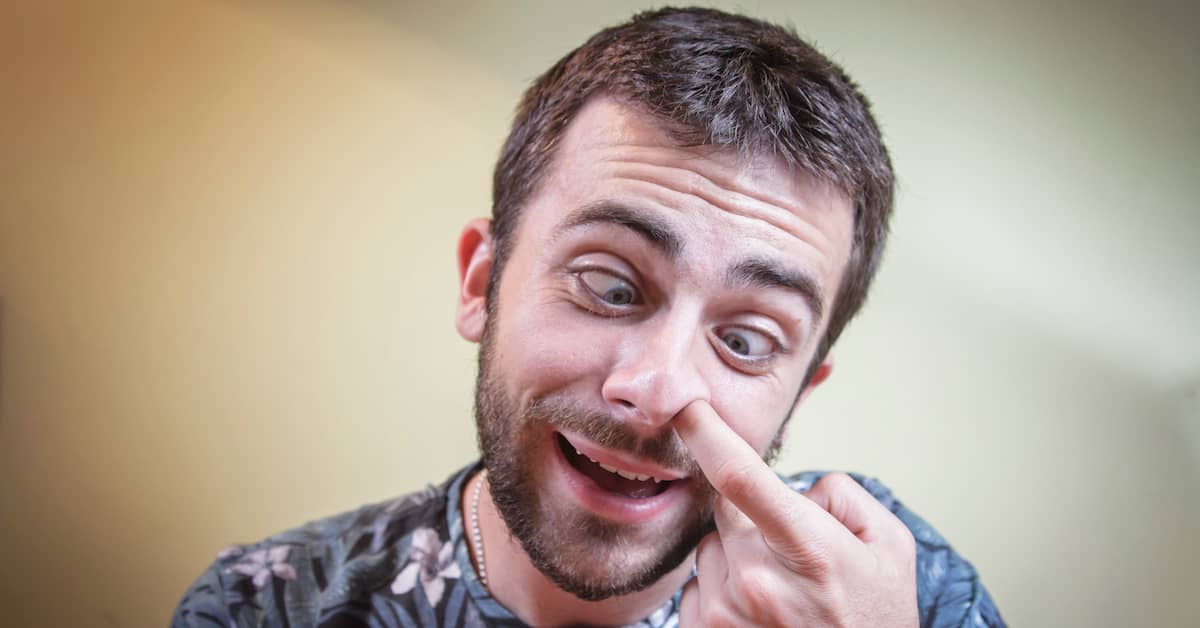
To Protect Against Dementia, Don’t Make It A Habit
Bradley Otto, M.D., the director of rhinology at The Ohio State University Wexner Medical Center, explains, saying, “When nose-picking becomes habitual, that’s when a problem can begin. “It doesn’t take much of a scratch to the surface of your nose to make you bleed pretty significantly. If you have long fingernails or you’re a little bit rough, you can scrape that lining and cause scabbing that then may allow bacteria from the nasal skin to collect there.” So, there’s potential for harm from this habit. But Alzheimer’s? Isn’t that a stretch too far?When Bacteria Invades The Brain
To see if bacteria can truly enter the brain this way, a research group from Griffith University in Queensland, Australia, conducted a study on Chlamydia pneumoniae. This pathogen mainly infects the lungs and nasal passages, but it’s also been linked to heart disease, inflammatory arthritis, multiple sclerosis, and late-onset dementia. In one study 90 percent of post-mortem brains from late-onset dementia patients contained C. pneumoniae DNA, compared with only five percent of age-matched dementia-free controls. In another study C. pneumoniae was found in 80 percent of dementia patients’ brains compared to 11 percent of controls. Its presence also results in deposits of amyloid beta, the protein that builds brain plaques and is a hallmark of Alzheimer’s disease. This isn’t surprising because it’s well known that amyloid beta is an antimicrobial peptide, released by neurons in response to infectious agents. In other words, if ANY infectious germs enter brain tissue, the brain’s response is to make more amyloid beta protein. Researchers believe that the C. pneumoniae pathogen mostly reaches the brain by seeping into the bloodstream via infected lung tissue. Once in the blood it can travel to the brain and cross the blood-brain barrier. But it can also make the journey by another route. It can use two nerves that extend between the nasal cavity and the brain. These are the olfactory nerve, responsible for our sense of smell, and the trigeminal nerve, which carries sensory input. These two nerves connect with the brain at the olfactory bulb and the brainstem, respectively. Previous laboratory research has demonstrated that a variety of different pathogens can use this route to enter the brain.Sets Off Alzheimer’s-Like Pathologies
For the new study the researchers injected mice with either C. pneumoniae or saline intranasally. They found the microbe infected both nerves, the olfactory bulb, and the brain within 72 hours. After a week the pathogen started to cause dysfunction in key pathways known to be involved in the development of Alzheimer’s disease. Within the olfactory system clusters of amyloid beta formed around the microbe. After 28 days, genes related to Alzheimer’s disease development were more abundant. One member of the research team, Professor James St. John, explained, saying, “We’re the first to show that C. pneumoniae can go directly up the nose and into the brain where it can set off pathologies that look like Alzheimer’s disease. We saw this happen in a mouse model, and the evidence is potentially scary for humans as well. “We need to do this study in humans and confirm whether the same pathway operates in the same way. What we do know is that these same bacteria are present in humans. “Picking your nose and plucking the hairs from your nose are not a good idea. We don’t want to damage the inside of our nose and picking and plucking can do that. If you damage the lining of the nose, you can increase how many bacteria can go up into your brain.”My Takeaway
This research reveals more than the just the dangers of nose-picking. It points to the dangers of illness-causing pathogens and their potential role in causing Alzheimer’s-related dementias. In my view, it’s another good reason to do what you can to avoid illness and stay reasonably healthy. A nutrient-rich diet, immune-boosting nutritional supplementation and a healthy lifestyle are critical ingredients to avoiding illness. When you do get sick, and everyone does at some point, don’t try to push through your fever or infection. Instead, slow down, rest, get extra sleep, care for your body, and enjoy healthy, nutrient-rich meals. And as always, see your doctor if you have symptoms that “just won’t go away.” You’ll be doing more than restoring your health, you’ll be protecting your memory for years to come.- https://pubmed.ncbi.nlm.nih.gov/7852253/
- https://wexnermedical.osu.edu/blog/how-harmful-is-it-to-pick-your-nose
- https://www.nature.com/articles/s41598-022-06749-9
- https://news.griffith.edu.au/2022/10/28/new-research-suggests-nose-picking-could-increase- risk-for-alzheimers-and-dementia/
- https://www.technologynetworks.com/neuroscience/news/could-nose-picking-increase- alzheimers-risk-367114
